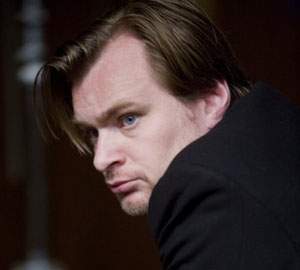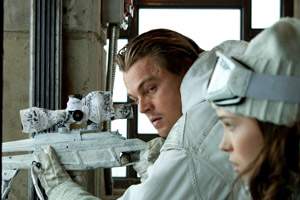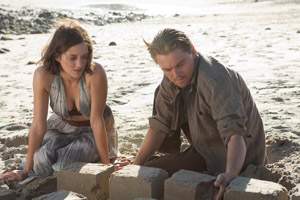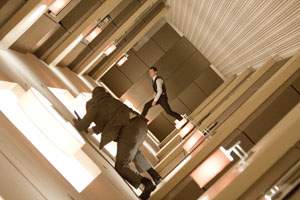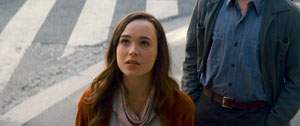You were developing this film for decade, can you tell us a bit about how you got it from a concept in your mind and onto the screen? I'd always wanted to address dreams in filmmaking and do something set in this world. About ten years ago I focussed in on the idea of exploring a technology that allows people to share dreams, and the uses and abuses of that., and came up with this idea of really trying to tell the story of a heist – a heist film – set in the world of dreams, with a technology that would allow somebody to penetrate someone else's subconscious. The idea was to always tell a large-scale action film, with an unusual twist to the world in which it takes place.
Did the success of THE DARK KNIGHT help to sell this story to the studio? Having had the success we did with THE DARK KNIGHT, which we were extremely happy with, and surprised by frankly, it certainly made it a lot easier to go to the studio with something very different and get the backing of the studio. At the same time, I have to acknowledge that I went to them with the concept nine years earlier and they were definitely up for it. It was actually me who said I want to wait; I'm not ready to make this yet. I don't know how to finish the script; I don't know how to do this kind of film yet. A lot of things came into play, including me growing into the film.
What are the challenges of making this movie, which is shot in six countries and filled with spectacular practical effects? For me. The underlying tone of the thing is best summed up by Leo's character in the film when he says, "The dreams feel real while we're in them". So everything we did in a production sense was aimed at trying to retain a tactile sense of reality to the world of the dreams, so they felt like possible worlds even as impossible things were happening. That posed a lot of challenges for certain departments in terms of things like a freight train barrelling down the street and smashing into cars and things. We wanted to do these things for real, so they would feel possible to the audience and we wouldn't have an obviously surreal quality to things. That's why we travelled to real locations and went all around the world, and shot in blizzards and so forth. Hopefully that all adds up to some greater sense of reality to the world of dreams.
When the film was being made it was kept under a very tight veil of secrecy. How difficult was it to achieve? It's difficult to keep anything fresh for an audience these days, with technology being what it is. People seem to know everything about a film before you've even made it. For me, as a filmgoer, I like nothing more than to sit in the cinema and have the lights go down, and not know what I'm about to see unfold on screen. Every time we go to make a film, we do everything we can to just systematise things so that we're able to make a film in private. When it's finished it's for the audience to make of it what they will.
Do you see a similarity between filmmaking and dream making? From my point of view as a director it is certainly the case, now that I look at INCEPTION as a finished film, it is probably as close as I want to get to making a film about filmmaking. In writing the script and trying to imagine a creative process whereby you would create an alternative reality for someone within the story, I naturally gravitated towards the creative process that I know, which is when you try to create an alternative reality for an audience. You put together a team of very talented people and you have them figure out their particular angle on the reality you are trying to put together. When I'm watching the scenes when the team is putting the whole plan together, it reminds me very much of the processes we go through in filmmaking.
You obviously spent a lot of time setting up the world and its rules. How was that compared with the more realistic films you've made, including the Batman ones? And would you like to revisit the world of INCEPTION again, at a later date? With every film you take on, you try and establish, if not the rules of a world particularly, but the arena and tone of what you are working with. In taking on the idea of dreams you have a burden on the rules of the film because you have to set some sort of limitations, because dreams are infinite and have infinite potential, which is the thing that makes them fascinating in the first place, but it also makes them hard to address in drama. Because anything can happen, how does anything matter? The rules of the world were designed to put limits on the thing. The key thing in my head was to make it the story of a con – the story of fooling another character. As soon as you're talking about trying to fool somebody, or taking on the heist idea of trying to create a reality for someone else, then naturally the team must adhere to certain rules, certain limitations on what they could be doing in the dream so that they don't fracture the illusion of reality. That's really the basis of the rule set. My interest in the world is in creating one that you feel could have infinite possibilities through its rule set, through its geography if you like. Certainly what I want for the audience is I want them to leave the cinema with a feeling of potential and a feeling of possibility for that world.
You're an old school filmmaker, how long do you plan to survive in the digital realm? And can you tell us more about working with IMAX, and what you think about the latest fad for 3D? That's a lot of technical issues to cover and I wouldn't want to bore you with it. People who know me know I can passionately speak about these things for hours. The bottom line is, this film was made in a traditional way: we shot film; we cut the negative; we photochemically timed the film. The reason I do that is it is still the best way to get the quality in the shortest amount of time for the least amount of money. In my opinion, it is the best way of doing things technically. It gets better and better as fewer and fewer people do it because you go to the lab and they give you a lot of attention. When I started out, a struggling 16mm filmmaker, it was all you could do to get your film processed. As far as future developments – things like, I'd love to see IMAX develop smaller, lighter cameras, but at the same time the R & D costs are extensive, considering how few people shoot with those cameras. 3D is something I'm looking at, but I see significant technical limitations to the presentation format. Most of it to do with the dimness of the image and the fact that we have to wear those glasses. The post conversion process can be done very effectively – we actually did tests on it for this film – but decided we didn't have time to get it to the standard we wanted, but it is perfectly possible to do it if you are acquiring on a high-quality film format, you should be able to do a very good post conversion, with enough time.
What about the use of the Piaf song in the film? The song was always in the script. For ten years it's been in the script. Marion Cotillard coming into the project was a nice coincidence. I thought about changing it, knowing I would get this question every time I talked about the film. Maybe I'm a bit of a fatalist, but I kind of liked the idea of the connection, but it is a pure coincidence. I don't know why I chose that song. I just wanted something with a very distinctive opening that could be used in the way it is.
Which was the most challenging action sequence, of the many there are, for you to direct? I think the most challenging were the zero gravity ones, and we were very fortunate to have Joe (Joseph Gordon-Levitt) do them. Not only is he naturally acrobatic, but he is also very dedicated to making that illusion work. The difficulty of what he was doing was extraordinary, hanging upside-down for hours at a time, and choreographing fight scenes that way but he makes it look extremely natural and extremely easy, and that's why those illusions work. For me, I was taking a huge risk in building these sets in this way with these rigs because if Joe hadn't wanted to do it or been as good at it as he was, we'd have been in terrible trouble. I have no idea what I would have done at that point. That's what I thought would be the hardest, but Joe made it go very easily. What really turned out to be the hardest, simply because it was the most ambitious, was we had to shoot all these scenes in heavy rain, and specifically scripted in heavy rain, and we had to shoot them in Los Angeles in the middle of summer and that proved to be really tough. We didn't want to do it all through visual effects, so we had to put rain towers on tops of buildings. Dealing with conditions like that, whether you're creating them yourself, or they're imposed on you by Mother Nature, makes everything very, very tricky. Just in terms of the equipment, in terms of keeping people dry when they need to be dry, etc, etc, proves to be very challenging.
Do you think we will ever have the technology to access each others dreams? I don't think we will. Whilst I enjoyed playing with the idea as a science-fiction idea, and as a jumping off point for a story, I came away from the experience thinking it is extremely valuable that our dreams are private and we have the opportunity every night to look at our lives in a different way and process them with no consequences. I don't think it would be a good thing. Also, when you start thinking about the potential of the human mind, and it's ability to create an entire world and perceive it at the same time – things like that, I come away feeling that our minds are not remotely understood by science, which makes it very unlikely such a technology could exist.
There are quite a few references to Greek mythology, such as Ellen Page's character being called Ariadne. Was there a specific intention with that? Ididn't put too much thought into it really. I've always been fascinated with the idea of mazes and labyrinths, and the mythology that relates to that, and the idea of the Minotaur and the labyrinth, and Ariadne is the guide through that was just something I gravitated towards. I try not to analyse too much and be too self-conscious. There are a lot of references in the names of the characters to things, like the character of Eames, for example, was a reference to the designers. There are things like that that I like to put in the film, almost to acknowledge the influences on the film, and Ariadne is a clear example of that.
